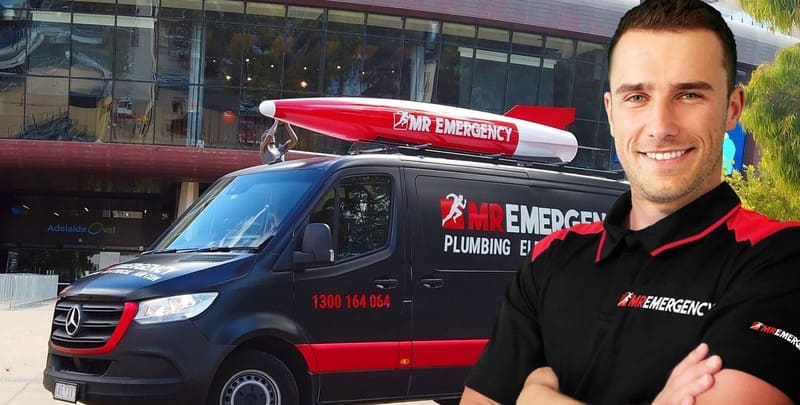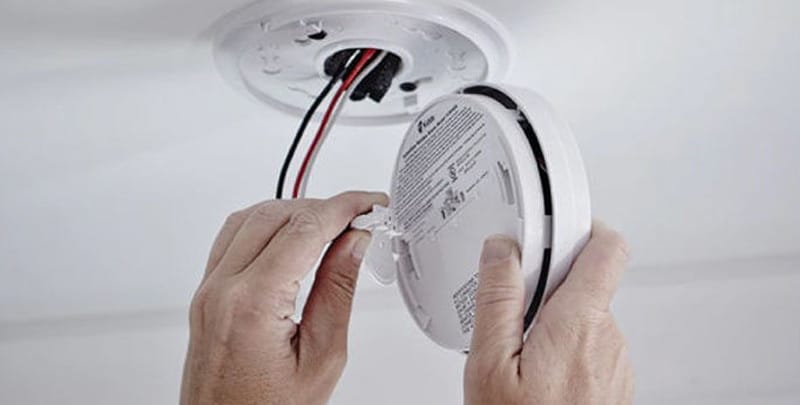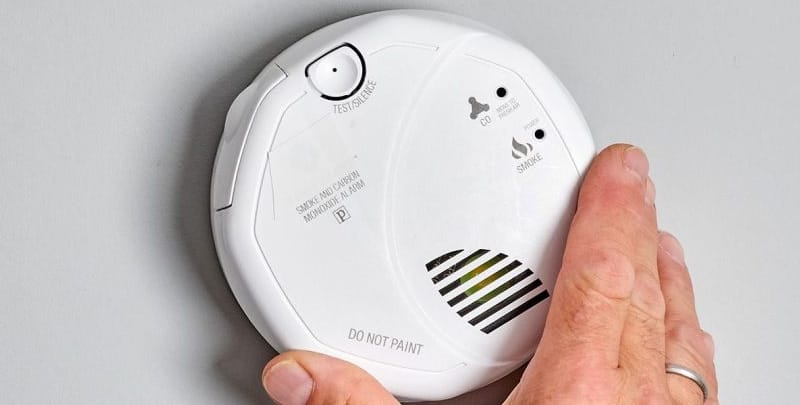
Importance of Proper Installation for Optimal Performance
In every home, smoke alarms are vigilant guardians against the silent threat of fires. These tiny devices play a crucial role in fire emergencies, detecting smoke early on, providing the precious moments needed for evacuation, and preventing potential disasters. Their significance cannot be overstated, making them an indispensable component of home safety.
While the benefits of smoke alarms are evident, their efficiency is only maintained if installed correctly. This leads us to the focal point of our discussion – the critical importance of selecting a reliable contractor for smoke alarm installation.
In the upcoming sections, we’ll delve into the fundamentals of smoke alarms, the repercussions of poor installation, and the key attributes to look for in a contractor.
Call in the Professionals
Professional smoke alarm installation is crucial for several reasons, as it plays a vital role in ensuring the safety of individuals and property in the event of a fire.
Here are some key reasons highlighting the importance of professional smoke alarm installation:
- Proper placement: Professional fire alarm installers are trained to determine the optimal locations for smoke alarms. Correct placement of smoke particles is critical to ensure early detection of smoke or fire, providing occupants more time to evacuate safely.
- Code compliance: Professional installers of smoke alarm solutions are knowledgeable about local building codes and regulations regarding smoke alarms. Ensuring compliance with these codes is essential for the overall safety of the building and its occupants.
- Technical expertise: Smoke alarms come in various types, including ionisation and photoelectric detectors. Professional installers have the technical expertise to select and install the correct type of smoke alarm for specific areas within a building based on factors such as space size and potential fire risks.
- Interconnected system: Interconnected smoke alarms are often required or recommended in more significant or multi-story buildings or residential properties. Professional installers can set up these systems so that if one alarm detects smoke, all interconnected smoke alarms throughout the building will sound, providing a more effective early warning.
- Battery and power source considerations: Professionals can ensure that smoke alarms are powered correctly, whether through hardwiring into the electrical system, battery power, or a combination of both. They can also advise on the appropriate type and lifespan of batteries.
- Regular maintenance: Professional installers working on smoke alarms can educate homeowners or property managers on the importance of regular maintenance of a smoke alarm, including testing and cleaning. This helps ensure that the alarms are always in proper working condition.
- Reducing false alarms: Improperly installed smoke alarms may lead to false alarms, which can be inconvenient and cause occupants to ignore future alarms. Professional installation reduces the likelihood of false alarms by ensuring they are placed correctly and compatible with the environment.
- Integration with home security systems: In some cases, smoke alarms may be integrated into home security systems. Professional installers can set up and integrate these systems to provide a comprehensive approach to home safety.
- Peace of mind: Knowing that smoke alarms are professionally installed provides peace of mind for occupants. This confidence in the reliability and effectiveness of the warnings contributes to a safer living or working environment.
In summary, professional smoke alarm installation is essential for ensuring smoke alarms’ proper functioning, placement, and compliance. This proactive approach enhances the safety and protection of individuals and property during a fire.

The Consequences of Poor Installation
Poor smoke alarm installation can have serious consequences, as smoke alarms are crucial in early warning of potential danger during a fire and can save lives.
Here are some potential results of inadequate smoke alarm installation:
- Delayed detection of fires and property damage: Ineffective placement may result in delayed fire detection. This can reduce the amount of time available for occupants to evacuate safely. A delayed response to a fire can result in more extensive property damage. Quick detection allows for a faster response from firefighting services, reducing the overall impact of the fire.
- Inadequate coverage: If there are not enough smoke alarms or if they are not strategically placed, certain living areas within the house may lack coverage. This can result in occupants not receiving timely warnings.
- False alarms: Poor installation may also lead to false alarms, either due to the placement of the smoke alarm near sources of steam or smoke (e.g., kitchens) or faulty equipment. False alarms can lead to complacency and may result in people ignoring fire alarm call signals.
- Lack of maintenance: Inadequate backup battery installation may indicate a lack of attention to maintenance. Smoke alarms that are not properly maintained, with dead backup batteries or expired units, can fail to operate when needed.
- Non-compliance with building codes: Building codes often specify the minimum requirements for smoke alarm installation in different types of structures. Failure to comply with these codes may result in legal consequences, and insurance claims could be affected.
- Legal and insurance implications: In some jurisdictions, there may be legal requirements for installing and maintaining smoke alarms. If a fire occurs and it is found that smoke alarms were not properly installed properly or maintained, legal consequences and insurance issues may arise.
- Increased emergency response time: In cases where smoke alarms are not adequately connected to monitoring systems, emergency responders may not be alerted as quickly. This leads to a slower response time, potentially affecting life safety and property protection.
Following manufacturer guidelines and local building codes is a crucial aspect when installing smoke alarms.
Regular testing, maintenance, and battery replacement are essential to ensure the proper functioning of the fitting smoke alarms.
Additionally, homeowners and occupants should be educated about the importance of smoke alarms and fire safety practices.
Qualities to Consider in Hiring a Reliable Contractor
Hiring a reliable contractor for smoke alarm installation is crucial to ensure your property’s and its occupants’ safety. Here are some qualities to look for when selecting a contractor for this important task:
- Licences and certifications: Ensure that the contractor holds the licenses and certifications required by local authorities. This ensures that electrical contractors show they have the knowledge and skills needed for proper installation.
- Experience: Look for contractors with a proven track record in smoke alarm installation. An experienced contractor is more likely to be familiar with various types of smoke alarms installed and can handle different installation scenarios.
- Customer references and reviews: Ask for references from previous clients and check online reviews. This provides insights into the contractor’s reliability, professionalism and the quality of their work. Assess the contractor’s customer service approach. Are they responsive to your inquiries? Do they treat you with respect? A contractor with good customer service will provide a positive overall experience.
- Insurance: Verify that the contractor has liability insurance. This protects you in case of any damage to your property during the installation process.
- Up-to-date knowledge: A reliable contractor stays informed about the latest technology, regulations, and best practices in smoke alarm installation. They should be able to recommend the most suitable fire alarms for your property.
- Attention to detail: Smoke alarms must be correctly installed and according to specific guidelines to ensure their effectiveness. A reliable contractor pays attention to details and follows the manufacturer’s instructions and local building codes.
- Communication skills: Effective communication is essential. The contractor should be able to explain the installation process, answer your questions, and keep you informed about the progress of the work.
- Timeliness: Punctuality is a sign of professionalism. A reliable contractor arrives on time and completes the installation within the agreed-upon timeframe.
- Warranty: A reputable contractor stands by their work and may offer a free quote or a warranty on the installation. This gives you peace of mind and shows the contractor’s confidence in their services.
- Problem-solving skills: Sometimes, unexpected issues may arise during installation. A reliable contractor has problem-solving skills and can address challenges effectively.
By considering these qualities, you can increase the likelihood of hiring a reliable contractor for smoke alarm installation. Always conduct thorough research and ask for recommendations to make an informed decision.

Hire a Professional Contractor Now
Beyond the technical aspects, a reputable contractor prioritises timely and efficient installation, providing peace of mind and maximum protection to homeowners and occupants. The speed and accuracy of building can be critical in emergencies, where every second counts.
A trustworthy contractor brings knowledge and experience to the table, ensuring they install smoke alarms strategically placed under industry standards and regulations.
Proper installation not only maximises the effectiveness of the alarms but also minimises the significant risk of false alarms or malfunctions. A reliable contractor can also guide homeowners in selecting high-quality, compliant smoke alarms, contributing to the system’s overall reliability.
Ultimately, investing in a reliable contractor for smoke alarm installation is an investment in the safety of one’s home and loved ones.
By choosing a professional with a proven track record, individuals can rest assured that their smoke alarm system is not only compliant with safety standards but also optimised for maximum effectiveness, offering a crucial line of defence against the devastating impact of fires.
The importance of this decision cannot be overstated, as it directly influences the level of protection and preparedness against potential fire hazards and life-threatening events.
Please note: This information is provided for advice purposes only. Regulations differ from state to state, so please consult your local authorities or an industry professional before proceeding with any work. See our Terms & Conditions here.


